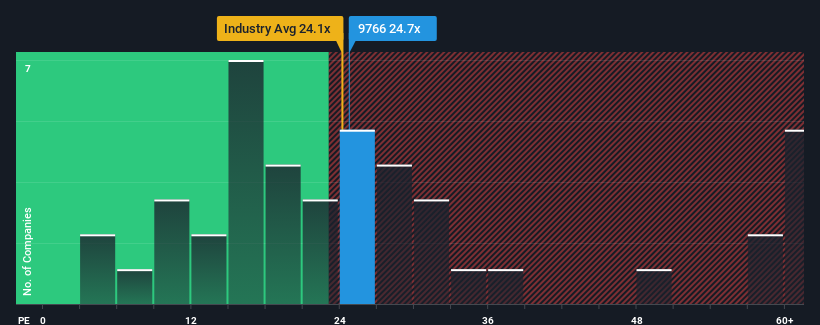- Japan
- /
- Entertainment
- /
- TSE:9766
Pinning Down Konami Group Corporation's (TSE:9766) P/E Is Difficult Right Now

When close to half the companies in Japan have price-to-earnings ratios (or "P/E's") below 13x, you may consider Konami Group Corporation (TSE:9766) as a stock to avoid entirely with its 24.7x P/E ratio. However, the P/E might be quite high for a reason and it requires further investigation to determine if it's justified.
With earnings growth that's superior to most other companies of late, Konami Group has been doing relatively well. It seems that many are expecting the strong earnings performance to persist, which has raised the P/E. If not, then existing shareholders might be a little nervous about the viability of the share price.
Check out our latest analysis for Konami Group

Is There Enough Growth For Konami Group?
There's an inherent assumption that a company should far outperform the market for P/E ratios like Konami Group's to be considered reasonable.
Taking a look back first, we see that the company grew earnings per share by an impressive 76% last year. The strong recent performance means it was also able to grow EPS by 53% in total over the last three years. Therefore, it's fair to say the earnings growth recently has been superb for the company.
Turning to the outlook, the next three years should generate growth of 6.5% each year as estimated by the analysts watching the company. That's shaping up to be materially lower than the 9.4% per annum growth forecast for the broader market.
With this information, we find it concerning that Konami Group is trading at a P/E higher than the market. Apparently many investors in the company are way more bullish than analysts indicate and aren't willing to let go of their stock at any price. There's a good chance these shareholders are setting themselves up for future disappointment if the P/E falls to levels more in line with the growth outlook.
The Key Takeaway
Using the price-to-earnings ratio alone to determine if you should sell your stock isn't sensible, however it can be a practical guide to the company's future prospects.
We've established that Konami Group currently trades on a much higher than expected P/E since its forecast growth is lower than the wider market. When we see a weak earnings outlook with slower than market growth, we suspect the share price is at risk of declining, sending the high P/E lower. Unless these conditions improve markedly, it's very challenging to accept these prices as being reasonable.
A lot of potential risks can sit within a company's balance sheet. Our free balance sheet analysis for Konami Group with six simple checks will allow you to discover any risks that could be an issue.
If these risks are making you reconsider your opinion on Konami Group, explore our interactive list of high quality stocks to get an idea of what else is out there.
Valuation is complex, but we're here to simplify it.
Discover if Konami Group might be undervalued or overvalued with our detailed analysis, featuring fair value estimates, potential risks, dividends, insider trades, and its financial condition.
Access Free AnalysisHave feedback on this article? Concerned about the content? Get in touch with us directly. Alternatively, email editorial-team (at) simplywallst.com.
This article by Simply Wall St is general in nature. We provide commentary based on historical data and analyst forecasts only using an unbiased methodology and our articles are not intended to be financial advice. It does not constitute a recommendation to buy or sell any stock, and does not take account of your objectives, or your financial situation. We aim to bring you long-term focused analysis driven by fundamental data. Note that our analysis may not factor in the latest price-sensitive company announcements or qualitative material. Simply Wall St has no position in any stocks mentioned.
About TSE:9766
Konami Group
Primarily engages in the digital entertainment, amusement, gaming and systems, and sports businesses.
Flawless balance sheet with solid track record.
Similar Companies
Market Insights
Community Narratives



